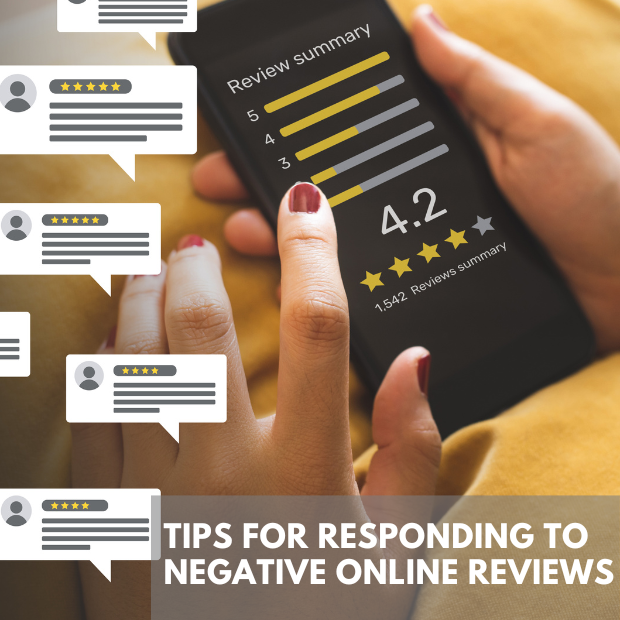
5 Tips For Responding To Negative Online Reviews
A local consumer review survey by Brightlocal shows that 98% of consumers occasionally read reviews for local businesses. This means that one of the first things potential customers will do is look up your business online. Therefore, having online reviews is crucial for your business’s success.
But what happens when you receive negative reviews? Negative reviews can hurt your brand’s reputation and turn away potential customers. They can also affect your search engine rankings, as Google considers the quantity and quality of your reviews when ranking your business.
However, negative online reviews are not all doom and gloom for your business. 53% of consumers say that they prefer to read a mix of positive and negative reviews from a business when buying online.
Negative reviews can be an opportunity to showcase excellent customer service and improve your online reputation, but only if you respond to them correctly.
5 Effective Tips For Replying To Negative Reviews
1. Monitor Comments & Prioritize Responses Based On Severity
Social listening lets you know conversations taking place around your brand and products. It gives you insights into customer concerns and perceptions about your brand. These concerns and perceptions become particularly useful when responding to negative feedback.
Online comments can either be positive, neutral, or negative. Responding to all types of comments is critical to building and maintaining a positive brand image. More so, responding to negative comments tactfully is vital to maintaining brand health.
Negative comments can be about different issues like product and service problems, and minor complaints and call-outs. Displaying empathy and employing a calm, respectful, and personalized approach when dealing with such comments can turn an angry customer into a happy one. This increases the chances of them doing repeat business with you.
Ensure you have an escalation management strategy in place to prioritize negative comments. This strategy enables you to rank customer issues based on severity, ensuring that they’re handled quickly and by the right person.
2. Move Difficult Conversations To Private Channel
While addressing negative online reviews publicly is critical, try to delve deeper into each customer’s issues privately. This approach shows other customers that you’re proactive in resolving complaints. It also demonstrates professionalism and respect for the individual’s privacy with the negative experience.
Respond to their review by recognizing their concerns and then offer a direct channel for further communication. For example, you might write:
“Thank you, (Reviewer’s Name), for sharing your experience. We understand your frustration and would like to learn more to make this right. Please contact us at [email protected] or call us directly at (Phone Number) so we can assist you further. Our team is dedicated to improving your experience and ensuring this issue is resolved satisfactorily.”
3. Create Policy and Procedure
Clear and consistent policies and procedures are the backbone of effective communication, especially when it comes to handling negative comments. These guidelines create a standardization for responding to negative feedback. In turn, they empower your team to respond to criticism in a way that aligns with your brand’s values and public image.
Policy and procedure also help your team identify which negative reviews need a full-scale response and which can be resolved with a simple apology or assistance. Essentially, they allow you to manage negative feedback swiftly and constructively, minimizing the impact on your brand’s reputation.
4. Always Take The High Road – Don’t Argue Online
When you encounter negative comments about your business, it’s natural to feel upset or even angry. However, it’s crucial to maintain composure and remember that your public response reflects on your business. Getting defensive can often escalate the situation, casting a shadow on the professional image you’re trying to uphold.
Defensive responses also give the impression that your brand is not open to criticism. This can deter potential customers who value transparency and accountability.
When addressing negative reviews, be understanding and constructive. Doing so creates an atmosphere where feedback is used as a stepping stone for improvement rather than conflict.
5. Respond Quickly To De-Escalate
A delayed response to online reviews is like letting a wound fester. It only worsens over time. When you don’t address criticism promptly, this magnifies the original complainant’s frustration and allows other customers to react, often exacerbating negative sentiments.
Acting swiftly shows that you are attentive and committed to customer satisfaction, thereby containing the situation before it spirals further. Remember, a swift reply can turn a critic into an advocate, so never underestimate the power of a timely response.
Final Thoughts
As long as you have an online presence, you’re bound to get negative reviews. Embracing criticism and responding promptly is key to maintaining a sterling online presence.
Remember, each negative interaction presents an opportunity to demonstrate the integrity and dedication of your brand. Use the tips shared in this guide to manage negative online reviews effectively and turn them into positive experiences.
To ensure the best outcome when dealing with negative comments, consider the professional services of The Hoyt Organization. Our team specializes in crafting responses to negative reviews and comprehensive social media monitoring, safeguarding and enhancing your brand’s reputation.
- Media Management Tips For C-Suite Executives - July 22, 2024
- Mastering Media Relations: Tips To Increase Media Coverage - July 15, 2024
- PR Crisis Management Strategies for College Administrators - July 9, 2024








